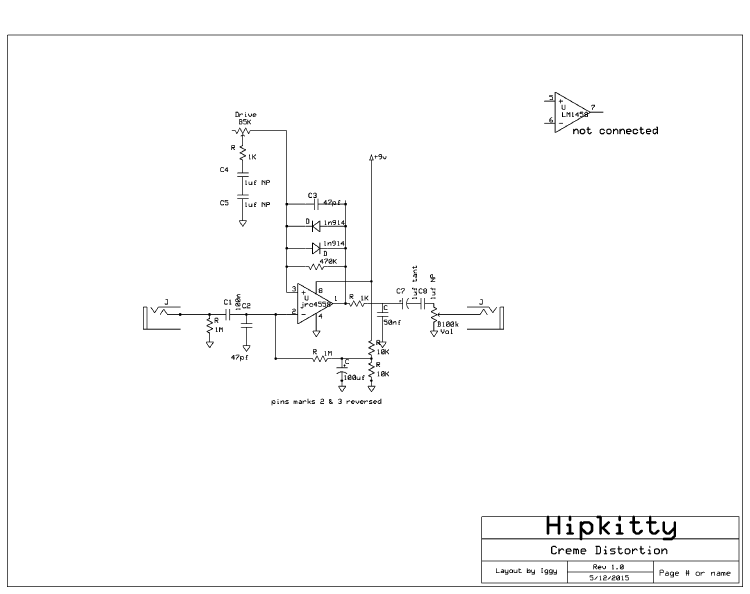Diode question
|
This post was updated on .
Heya everyone.
Can someone educate me on how well a D9E, D9B or D311 will work with a circuit in place of 1n914's please? Cheers Chris
Yeah, 220, 221. Whatever it takes.
|
|
What do you want the Ge diodes for Chris? I assume you want them for clipping, but which circuit?
What you can expect is a lot less volume and a softer drive sound than the Si diodes. It's possible though, depending on the circuit, that they just won't work well at all, or will sound poor. They can sound fantastic in the right circuit, but they are not a magic bullet. Sometimes they are just the wrong choice. Ultimately though, there is only one way to find out for sure - breadboard it, or use sockets and try it for yourself. |
|
Good points indeed. The circuit is the Hipkitty Creme Distortion.
It's a low part count and thought I would experiment a bit since I do happen to have 50 of each mentioned. Here's a quick glance at the schem. 
Yeah, 220, 221. Whatever it takes.
|
|
It's not a circuit I am familiar with, so I really can't say. My experience with them suggests they don't work that great in distortion circuits - IMHO they sound better in overdrives and fuzzes.
I would be expect some of the Russian Si diodes would be a better choice - somthing like D220 or KD521 (the Sovtek Big Muff diode) would be my first choice for testing. Sorry I can't be any more help. |
|
gotcha - wasn't really sure how tossing in a GE to a circuit for Si would have worked. I figured that I would at least start playing with GE's since I never really used em before.
Wasn't really serious about this particular circuit but since it was a low part count, I figured what the heck. Thanks mate, always appreciate your feedback :)
Yeah, 220, 221. Whatever it takes.
|
|
Seriously, give them a go - what have you got to lose. They might sound amazing.

|
|
The two interesting characteristics for clipping diodes are Vf (at what voltage does it start to conduct) and the knee (how sharp is the transition between conducting and not conducting). There are some disagreements about how important the knee is in hard clippers, some say only Vf matters and the rest is the power of suggestion. With soft clippers, like in the circuit you're looking at, the knee is going to be even less important. Even silicon will give you soft clipping in the feedback loop, so the softer knee isn't going to make much difference.
If you just want to see what will happen, try it out. That's what breadboards are for. Here's what I predict: Output volume will drop enough that you'll need a makeup gain stage. There may or may not be an increase in compression, but it will be hard to tell in an A/B test because the volume will be so different that Fletcher-Munson will start to be a major factor. The only designs I remember seeing with Ge feedback clippers have been asymmetric: 1 Ge and 1 Si, anti-parallel. I suspect that this gives nearly the same perceived volume as pure Si, but I haven't tried it. I won't guess what the tonal difference is, but I wouldn't be surprised if it wasn't especially noticeable. If you want to explore more, try 1 led and 1 Ge. This will make the asymmetry more pronounced. If you really want to use your Ge's in a feedback clipper, try putting two or more in series. That will kick the Vf up to a more useful level. It will also use up your Ge diodes faster, while giving a result that is probably not especially different from using single Si's. It's a good topic for breadboard exploration. Let us know what you find. |
|
Hey Chris - I completely agree with Beaker's first statement. I got some of those Russian torpedo diodes in a trade and they seemed to really suck gain out of a circuit - very soft. Of course, it could be dependent on the application, but I found them to be very different from any silicon diode or even some of the more common Ge diodes, much softer knee (as induction pointed out, "mushy" would also be a good term) and a significant volume loss.
|
«
Return to Open Chat
|
1 view|%1 views
| Free forum by Nabble | Edit this page |

